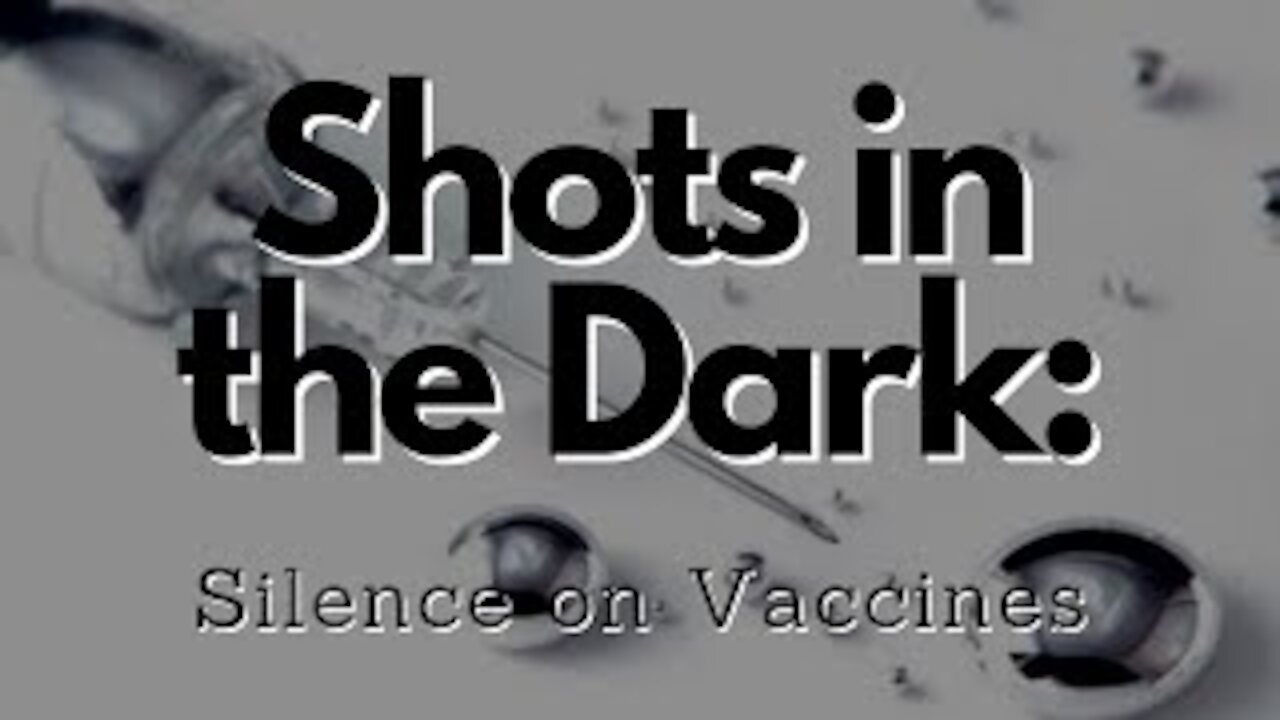Premium Only Content

Shots in the Dark: Silence on Vaccines
Following the increase in cases of autism and other immune disorders among some particularly vulnerable people, several recognized specialists are questioning the safety of large-scale vaccination. Despite the serious side effects, pharmaceutical companies, the medical profession, and government authorities continue to bury their heads in the sand, refusing to see a serious problem. In Quebec, the United States, and France, as in most industrialized countries, victims are almost without recourse despite the high toxicity of substances such as mercury and aluminum contained in vaccines. With this hard-hitting documentary, Lina B. Moreco highlights a very worrying public health problem.
Since they were introduced in the early 20th century, vaccines have been a tremendous medical and scientific success. Today perceived as a necessity, they are so familiar to us that their potential risks are rarely mentioned.
However, the stakes are significant. Based on recommendations of health agencies, North American children receive about 48 doses of 14 different vaccines before the age of 6 -- double the amount prescribed 25 years earlier. Despite this extraordinary increase, few studies independent of the pharmaceutical industry have been conducted into their long-term side effects. This is a disturbing situation given the numerous toxins, including mercury and aluminum, contained in some commonly administered vaccines.
Several worried pediatricians and scientists are sounding the alarm. Some of the research underway indicates that vaccination is directly responsible for immune or neurological disorders among certain people genetically or neurologically predisposed to react badly to vaccine components. Cases of autism, multiple sclerosis, Guillain-Barré syndrome, macrophagic myofasciitis, encephalitis, paralysis, and neuropathies indicate the seriousness of the situation.
Despite these findings, the pharmaceutical industry and government authorities deny there is a serious problem. Relying on perfunctory studies, some of which date back to the late 1920s, they reject out of hand any cause-and-effect relationship. Given the known fact that adding preservatives such as thimerosal (mercury) helps reduce production costs, the reaction of the pharmaceutical industry is at the very least puzzling. Preferring not to question a system that has proved its worth, a majority of the medical profession's members reject any potential toxicity in vaccines.
http://films.nfb.ca/shots-in-the-dark/
FAIR USE NOTICE: These Videos may contain copyrighted (© ) material the use of which has not always been specifically authorized by the copyright owner. Such material is made available to advance understanding of ecological, political, human rights, economic, democracy, scientific, moral, ethical, and social justice issues, etc. It is believed that this constitutes a 'fair use' of any such copyrighted material as provided for in section 107 of the US Copyright Law. In accordance with Title 17 U.S.C. Section 107, this material is distributed without profit to those who have expressed a prior general interest in receiving similar information for research and educational purposes. For more information go to: http://www.law.cornell.edu/uscode
-
 LIVE
LIVE
vivafrei
1 hour agoNo Epstein Client List? Yeah, Right... CBS Settles Trump Lawsuit! Madness in Canada & MORE!
15,228 watching -
 LIVE
LIVE
Dr Disrespect
4 hours ago🔴LIVE - DR DISRESPECT - RIDICULOUS WARZONE CHALLENGES
2,670 watching -
 LIVE
LIVE
Pop Culture Crisis
2 hours ago'Love Island' Star Cierra CANCELLED, Pedro Pascal CREEPY? 'SUPERMAN' Is About 'Politics' | Ep. 871
704 watching -
 DVR
DVR
FreshandFit
2 hours agoPodcaster "Rich And Unemployed" In Jail For $10M Fraud Bust!
2.42K2 -
 LIVE
LIVE
The HotSeat
1 hour agoThey’re Drowning the Truth: Texas Tragedy, Epstein Lies, and the Left’s Sick Celebration
705 watching -
 LIVE
LIVE
Film Threat
4 hours agoVERSUS: JURASSIC WORLD: REFUND | Film Threat Versus
88 watching -
 10:33
10:33
BlackBeltBarrister
4 hours ago $0.38 earnedIs This Ridiculous Yet?
4.12K3 -
 1:06:07
1:06:07
MTNTOUGH Podcast w/ Dustin Diefenderfer
6 hours agoPedro Ampuero: Stop Making Excuses and Start Exploring | MTNPOD #123
126 -
 1:51:10
1:51:10
The Quartering
4 hours agoTime To FIRE Pam Bondi , Texas Floods, Active Shooter At Border Patrol & More
90.3K40 -
 1:35:22
1:35:22
Russell Brand
4 hours agoSHOCK REPORT: DOJ, FBI Review Finds NO Jeffrey Epstein 'Client List,' Confirms Suicide - SF609
139K50